112 books for « minkowski »Edit
-
Latest
Last 3 days (1)
Last month (1)
-
Century
19th (3)
20th (71)
21st (2)
-
Countries
Belgium (14)
Denmark (12)
France (82)
Switzerland (6)
-
Syndicate
ILAB (55)
NVVA (4)
SLACES (4)
SLAM (39)
Topics
- Adonis (3)
- Archaeology (1)
- Biography (6)
- Childbirth (3)
- Collections (1)
- Couple (1)
- Dedication (1)
- Economics (1)
- Einstein (3)
- Ethic (1)
- Family (1)
- Fine arts (1)
- First edition (1)
- Guittoneau ben (2)
- Jordan (Country) (1)
- Le clézio (1)
- Literature (4)
- Mathematics (7)
- Medicine (8)
- Memories (3)
- Milliez paul (3)
- Minkowski alexandre (29)
- Minkowski eugène (1)
- Museums (1)
- obstetrics (2)
- Obstetrics gynaecology (1)
- Ollier (2)
- Philosophy (6)
- Photography (1)
- Physics (3)
- Poetry (1)
- Psychiatry neurology (4)
- Psychoanalysis (1)
- Psychology (3)
- Psychopathology (1)
- Review (3)
- Schizophrenia (1)
- Sciences (2)
- Sociology (1)
- Symbolism (1)
- Tea (2)
- Testimonies / stories (1)
- Youth (1)
LE TEMPS VECU. Etudes phénoménologiques et psychopathologiques.
Paris, J.L.L. d'Artrey. Collection de l'Evolution Psychiatrique, 1933, 170x250mm, broché, 401p. Bel exemplaire sans annotations.
La schizophrénie. Psychoathologie des schizoïdes et des schizophrènes.
Paris, Payot, BIbliothèque scientifique. , 1927, in-8, broché, 252 pages. Bon état.
Volumen und Oberfläche.
Leipzig, B.G. Teubner, 1903. Orig. printed wrappers. No backstrip. In: ""Mathematische Annalen begründet durch Georg Clebsch und Carl Neumann"", 57. Bd., 4. Heft. The whole issue offered (=4.heft). Pp. 425-572. Minkowski's paper: pp. 447-495.
First appearance of the formulation of the Minkowski Problem.The Minkowski problem deals with existence, uniqueness, regularity, and stability of closed convex hypersurfaces whose Gauss curvature (as a function of the outer normals) is preassigned. Major contributions to this problem were made by Minkowski in the offered paper.
Untersuchungen über Quadratische Formen. I. Bestimmung der Anzahl verschiedener Formern, welche in gegebenes Genus Enthalt (all issued). - [MINKOWSKI'S INAUGURAL- DISSERTATION]
Berlin, Uppsala u.Stockholm, Paris, 1885). 4to. No wrappers as extracted from ""Acta Mathematica. Hrsg. von G. Mittag-Leffler"", vol. 7, pp.201-258.
First edition of Minkowski's Inaugural-Dissertation in the periodical form.""Minkowski received his doctorate in 1885 at Königsberg" he taught at Bonn undtil 1894, then returned to Königsberg for two years. In 1896 he went to Zürich.where he was Hurwitz' collegue until 1902" Hilbert then obtained the creation of a new professorship for him at Göttingen, where Minkowski taught until his death. From his Grand Prix paper (1883) to hisd last work Minkowski never ceased to return to the arithmetic of quadratic forms in n ariables (""n-ary Forms""), Ever since Gauss' pioneering work on binary quadratic forms at the beginning of the nineteenth century, the generalization of his results to n-ary had been the goal of many mathematicians, including, Eisenstein, Hermite, Smith, Jordan, and Poincaré.""(DSB). - An error in this paper was found and corrected by C.L. Siegel in 1935.
"MINKOWSKI, H. (HERMANN). - THE UNIFICATION OF SPACE AND TIME (PMM 401).
Reference : 52692
(1909)
Raum und Zeit. (Space and Time). Vortrag von der 80. Naturforscherversammlung zu Köln.
Leipzig, S. Hirzel, (1909). 4to. Bound with orig. printed wrappers in fine later hmorocco. (Bound by Anker Kyster Eftf. 1968). Titlelabel in leather with gilt lettering on frontcover. Offprint (Sonderabdruck) from ""Physikalische Zeitschrift"", 10. Jahrgang. No. 3. Seite 104-111, here paginated as offprint pp. 1-8 and with textfigs. Clean and fine.
First edition - in the scarce offprint-issue - of this milestone paper where Minkowski was the first to conceive that the relativity principle formulated by Lorentz and Einstein led to the abandonment of the concept of space and time as separate entities and to their replacement by a fourdimensional ""space-time"", THE SPACE-TIME CONTINUUM. In the opening passage Minkowski declared: ""Henceforth, space by itself, and time by itself, are doomed to fadeaway in the shadows, and only a kind of union of the two will preserve an independent reality.""The work was simultaneously published in ""Jahresberichte der Deutschen Mathematiker-Vereinigung"". Leipzig 1909, in ""Verhandlungen der Gesellschaft Deutscher Naturforscher und Ärzte"". Leipzig, 1909 (a shorter version) and as here.The paper was read 20th of September 1908 at a Conference in Cologne only a few months before his death. Here ""he introduced the notion that made possible the expansion of the Relativity Theory of Einstein from its specific to its general form. The technical description of Minkowski's hypothesis is the four-dimensional Space-time continuum.... Minkowski's space-time hypothesis was in effect a restatement of Einstein's basic principle in a form that greatly enchanced its plausability and also introduced importent new developments. Hitherto natural phenomena had been thought to occur in a space of three dimensions and to flow uniformly through time. Minkowski maintained that the separation of space and time is a false conception"" thet time is itself a dimension, comparable to lenght, breadth and height: and that therefore the true conception of reality was constituted by a space-time continuum possessing these four dimensions. This strongly reinforced Einstein's objections to absolute concepts and supported his view of the relativity of events in nature."" (PMM No. 401).
Raum und Zeit. (Space and Time) - [THE FOURTH DIMENSION. (PMM 401)]
Leipzig, F.C.W. Vogel, 1909. Lex8vo. Contemp. Hcloth. Gilt spine. Edges slightly rubbed. Clean and fine. in ""Verhandlungen der Gesellschaft deutscher Naturforscher und Ärzte. 80. Vesammlung zu Cöln 20.- 26. September 1908. Herausgegeben...Albert Wangerin. Zweiter Theil. 1. Hälfte. Naturwissenschaftliche Abteilungen"". pp. 4-9. The whole volume offered with part I-II: (4),245,X,(2),598,124,(2) pp.
First appearance of this milestone paper in the development of the theory of Special relativity. The paper offered is the first edition, first printing of the text from Minkowski's famous address held at the 80th meeting of the Gesellschaft Deutscher Naturforscher und Ärzte, in Köln the 21st September 1908. There exists three other printings of this address from the same year:1. Physikalische Zeitschrift, volume 10, number 3 (1. February, 1909.), pp.104-111" 2. Jahresbericht der Deutschen Mathematiker-Vereinigung, volume 18, number 2 (issued monthly - so February), pp.75-88"3. (Seperate edition by Teubner).""The views of space and time which I wish to lay before you have sprung from the soil of experimental physics, and therein lies their strenght. They are radical. Henceforth space by itself, and time by itself, are doomed to fade away into mere shadows, and only a inf of union of the two will preserve an independent reality"" He ended as follows: 'the validitywothout exception of the world postulate (i.e., relativity postulates), I like to think, is the thrue nucleus of an electromagnetic image of the world, which, discovered by Lorentz, and further developed by Einstein, now lies open in the full light of the day'""(Pais in ""Subtle is the Lord"", p. 152).Here (in the paper offered) ""he introduced the notion that made possible the expansion of the Relativity Theory of Einstein from its specific to its general form. The technical description of Minkowski's hypothesis is the four-dimensional Space-time continuum....Minkowski's space-time hypothesis was in effect a restatement of Einstein's basic principle in a form that greatly enchanced its plausability and also introduced importent new developments. Hitherto natural phenomena had been thought to occur in a space of three dimensions and to flow uniformly through time. Minkowski maintained that the separation of space and time is a false conception"" thet time is itself a dimension, comparable to lenght, breadth and height: and that therefore the true conception of reality was constituted by a space-time continuum possessing these four dimensions. This strongly reinforced Einstein's objections to absolute concepts and supported his view of the relativity of events in nature."" (PMM No. 401, only listing the print from ""Jahresberichte der Deutschen Mathematiker-Vereinigung. Leipzig 1909."").
Untersuchungen über quadratische Formen. I. Bestimmung der Anzahl verschiedener Formen, welche ein gegebenes Genus enthält.
(Stockholm, F.& G. Beier), 1885. 4to. Orig. printed wrappers (to Acta Math. 7:3). Extracted from ""Acta Mathematica"", Vol. 7. Pp. . Clean and fine.
First printing of Minkowski's doctorial dissertation, which he received from Königsberg.""From his Grand Prix paper (on five squares integers) to his last work Minkowski never ceased to return to the arithmetic of quadratic forms in n variables (""n-ary forms""). Ever since Gauss' pioneering work on binary quadratic forms at the beginning of the nineteenth century, the generalization of his results to n-ary forms had been the goal of many mathematicians including Eisenstein, Hermite, Smith, Jordan, and Poincaré. Minkowski' most importent contributions to the theory were for quadratic forms with rational coefficients, through a system of three invariants of the form and (in a later paper) a paper from 1905.""(DSB).
Ueber die Annährung an eine reelle Grösse durch rationale Zahlen.
Leipzig, B.G. Teubner, 1901. 8vo. No wrappers. In: ""Mathematische Annalen. Begründet durch Rudolf Friedrich Alfred Clebsch. 54. Band. 1. Heft."" Entire issue offered with titlepage to vol. 54. IV,124 pp. Minkowski's paper: pp. 91-124.
First printing of one of Minkowski's importent papers on the geometrical theory of numbers.""Minkowski was always interested in mathematical physics but did not work in that field until the last years of his life, when he participated in the movement of ideas that led to the theory of relativity. He was the first to conceive that the relativity principle formulated by Lorentz and Einstein led to the abandonment of the concept of space and time as separate entities and to their replacement by a fourdimensional “space-time,” of which he gave a precise definition and initiated the mathematical study"" it became the frame of all later developments of the theory and led Einstein to his bolder conception of generalized relativity.""(DSB).Also with PAUL STÄCKEL ""Friedrich Ludwig Wachter, ein Beitrag zur Geschichte der nichteuklidischen Geometrie"", pp. 40-90.
Par-delà l'attente. Roman.
Paris : JC Lattès, 2022. In-8, 130 x 205 : 217 pp., (2 ff.), couverture imprimée en noir et rouge. — Broché.
Édition originale du premier roman de l'avocate pénaliste Julia Minkowski, retraçant la très médiatique affaire des soeurs Papin.Exemplaire enrichi d'un envoi autographe de l'autrice : "À Jacqueline et Robert Zeïtoun, Par-delà l'attente, où il est question de justice mais de médecine aussi. Bonne lecture. Julia Minkowski".
Diophantische approxiationen. Eine einführung in die Zahlentheorie --- EDITION ORIGINALE --- BEL EXEMPLAIRE
Leipzig, Teubner, 1907, un volume in 8 relié en cartonnage éditeur, 8pp., 235pp., (1pp.)
---- EDITION ORIGINALE ---- BEL EXEMPLAIRE ---- "MINKOWSKI received his doctorate in 1885 at Königsberg. He taught at Bonn, Königsberg, Zurich and Göttingen... From his Grand Prix paper to his last work Minkowski never ceased to return to the arithmetic of quadratic forms in n variables". (DSB IX pp. 411/414)**7451/N4
Kinetische Theorie der Materie. + (Minkowski:) Kapillarität.
(Leipzig, Teubner, 1907). No wrappers. as issued in Encyklopädie der mathematischen Wissenschaften V,8 pp. (494-)557 and (Minkowski:) pp. 558-613.
Both works first edition.
Relier Jean-Pierre Minkowski Pr Alexandre Minkowski Alexandre Lambrichs Louise L
Reference : 100058233
(1993)
ISBN : 2221074726
L'aimer avant qu'il naisse. Le Lien mère-enfant avant la naissance
Robert Laffont 1993 206 pages 13x22x2cm. 1993. Broché. 206 pages.
Très bon état cependant qq rousseurs sur tranche et dans les plats intérieurs très bonne tenue
Le temps vécu. Etudes phénoménologiques et psychopathologiques.
Paris Gérard Monfort, "Imago Mundi" 1988 1 vol. broché in-8, broché, 401 pp. Tampon d'ex-libris sur la page de garde. Très bon état.
Sauver la santé.
P., JC Lattès, 1985, in-8, br., photo de couv., 214 pp., annexes, bibliographie. (GK8)
Alexandre Minkowski, professeur de médecine à l'Université René Descartes;
Marc Minkowski, chef d'orchestre ou centaure : confessions
Séguier (11/2022)
LIVRE A L’ETAT DE NEUF. EXPEDIE SOUS 3 JOURS OUVRES. NUMERO DE SUIVI COMMUNIQUE AVANT ENVOI, EMBALLAGE RENFORCE. EAN:9782840499039
Eugène Minkowski.
Levallois-Perret, Interligne, 1999, in-8, toile gris acier éd., 166 pp., photos h.-t. (SS14*)
Une oeuvre philosophique, psychiatrique et sociale. Ex-dono à l'encre noire.
Klinische und genealogische Untersuchungen zur Kenntnis der progressiven Muskeldystrophie. Separatdruck: Archiv d. Julius Klaus-Stiftung.
Zürich, Druck u. Verlag Orell Füssli, 1928, gr. in-8vo, 60 S. (S. 239 -298) + 5 Stammtafeln, hs. Mit kollegialem Gruss von M. Minkowski, illustrierte Original-Broschüre.

(SLACES, NVVA)
Phone number : 41 (0)26 3223808
L'Impertinent.
Paris Lattès 1985 Un volume in-8 dos collé, couverture jaune illustrée, 222 pages. Envoi de l'auteur, bon état.
La librairie est ouverte du mardi au samedi de 9h30 à 12h30 et de 13h30 à 19h00. Commandes par courriel ou téléphone. Envoi rapide, emballage soigné.
Die Gicht. Von Dr. O. Minkowski. - Intermittirenden Gelenkschwellungen. Von Dr. H. Schlesinger. Mit 9 Abbildungen und 3 Tafel.Specielle Pathologie und Therapie. Hrsg. Hermann Nothnagel. VII. Band. III. Theil.
Wien, Alfred Hölder 1903, 250x175mm, VII- 381 + 27Seiten, broschiert.
Pour un paiement via PayPal, veuillez nous en faire la demande et nous vous enverrons une facture PayPal
Untersuchungen über Quadratische Formen. I. Bestimmung der Anzahl verschiedener Formen, welche ein gegebenes Genus enthält.
(Berlin, Stockholm, Paris, Almqvist & Wiksell, 1885. 4to. Without wrappers, but stitched, as extracted from""Acta Mathematica. Hrsg. von G. Mittag-Leffler"", Vol.7, pp. 201-258.
First appearence of Minkowski's doctoral dissertation, which he received in 1885 from Königsberg.
Le vieil homme et l'amour (Donner sa chance à chaque enfant du monde)
1994, Robert Laffont, collection Aider la vie, in-8 broché de 280 pages, écrit avec la collaboration de Natacha Kucic et le concours de Louise Lambrichs. Avec l'association Partage avec les enfants du monde et la région Île de france, le professeur Minkowski oeuvre pour que l'on donne aux populations les moyens de prendre elles-mêmes en charge leurs enfants en détresse. | Etat : Très bon état général (Ref.: Ref9046)
Robert Laffont
Le Mandarin aux pieds nus
Rombaldi 1976 1976. Relié.
Très bon état - légères marques de lecture et/ou de stockage mais du reste en très bon état- expédié soigneusement depuis la France
 Write to the booksellers
Write to the booksellers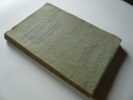
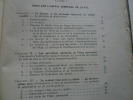
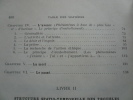
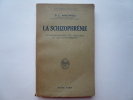
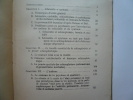
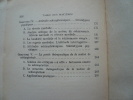
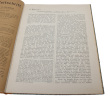

![Raum und Zeit. (Space and Time) - [THE FOURTH DIMENSION. (PMM 401)]. "MINKOWSKI, HERMANN.](https://static.livre-rare-book.com/pictures/LLX/42836_1_thumb.jpg)
![Raum und Zeit. (Space and Time) - [THE FOURTH DIMENSION. (PMM 401)]. "MINKOWSKI, HERMANN.](https://static.livre-rare-book.com/pictures/LLX/42836_2_thumb.jpg)
![Raum und Zeit. (Space and Time) - [THE FOURTH DIMENSION. (PMM 401)]. "MINKOWSKI, HERMANN.](https://static.livre-rare-book.com/pictures/LLX/42836_3_thumb.jpg)









